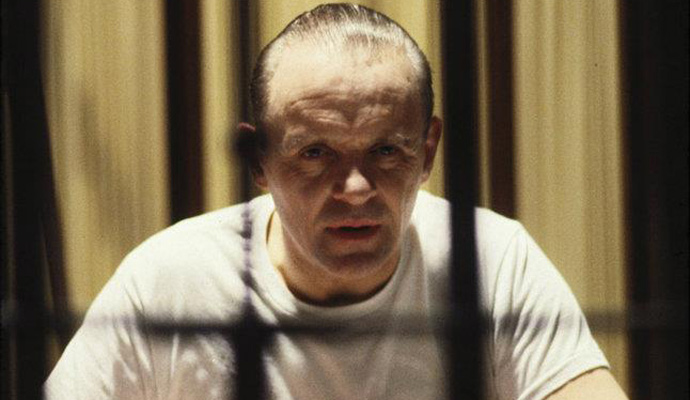Is Norman Bates a realistic psychopath?
A new study examines 400 movies to see whether Hollywood gets psychopathy right

A free daily email with the biggest news stories of the day – and the best features from TheWeek.com
You are now subscribed
Your newsletter sign-up was successful
Psycho's psycho leaves a lot to be desired.
At least that's the conclusion of a new study that tried to determine realistic portrayals of psychopathic behavior on the silver screen. According to forensic psychiatrists Samuel Leistedt and Paul Linkowski, who led a team that studied hundreds of films, Norman Bates was too delusional and disconnected from reality to qualify as being a psychopath. The world's most famous mama's boy, if they had to diagnosis him, was more psychotic than psychopathic.
Bates isn't alone. Psychopathy isn't what most movies make it out to be, Leistedt and Linkowski say, and most psychos in film, especially in the medium's early days, are either caricatures or based on a poor or incomplete understanding of the disorder. And because the definition of psychopathy has changed over the years, movie psychos from one era might be diagnosed differently today.
The Week
Escape your echo chamber. Get the facts behind the news, plus analysis from multiple perspectives.

Sign up for The Week's Free Newsletters
From our morning news briefing to a weekly Good News Newsletter, get the best of The Week delivered directly to your inbox.
From our morning news briefing to a weekly Good News Newsletter, get the best of The Week delivered directly to your inbox.
To gauge the realism of movie psychos and see how their portrayals have evolved, Leistedt and Linkowski put together a team of forensic psychiatrists and movie critics to watch 400 movies dating from 1915 to 2010. The majority of psychopathic characters were ignored because they had magical powers, were nonhuman, or were otherwise way too unrealistic. The 126 characters that were left got a closer look from the team to find the most accurate psychopaths.
Aside from giving screenwriters and actors an idea of what they're doing right or wrong, the researchers hope that their work can be a useful teaching tool for psychology and psychiatry students. Diagnosing and recognizing psychopathy isn't easy, and very few students will get to see the real deal during their training. A library of the best movie psychos could be the next best thing — and a lot safer.
Here are a few of the movie psychopaths that the study deemed realistic, and those that were the stuff of fantasy.
Realistic psychopaths
A free daily email with the biggest news stories of the day – and the best features from TheWeek.com

1. Anton Chigurh, No Country for Old Men. The bolt pistol-toting hit man was called out for a frighteningly realistic portrayal of a damaged mind. Leistedt and Linkowski call him a "well-designed prototypical idiopathic/primary psychopath," who displays an " incapacity for love, absence of shame or remorse, lack of psychological insight, inability to learn from past experience, cold-blooded attitude, ruthlessness, total determination, and lack of empathy." Chigurh reminded them of real-life contract killers they've studied, like Richard "The Iceman" Kuklinski.
2. Gordon Gekko, Wall Street. "One of the most interesting, manipulative, psychopathic fictional characters to date," say Leistedt and Linkowski. "Successful psychopaths" and "corporate psychopaths" like Gekko are getting more attention from filmmakers and clinicians alike in the wake of global economic crisis, and the researchers expect to see more figures like this pop up in both movies and newspaper headlines.
3. Henry, Henry: Portrait of a Serial Killer. The title character, inspired by real-life serial killer Henry Lee Lucas, shows a "powerful lack of empathy, emotional poverty, and a well-illustrated failure to plan ahead" that faithfully reflects the lack of stability in a psychopath's life.
4. Hans Beckert, M. "One of the first, rarest, and more realistic" portrayals before the 1960s, the character is an "outwardly unremarkable man tormented by a compulsion to murder children ritualistically, which is a substantially more realistic depiction of what would eventually be known today as a sexually violent predator (SVP)."
A little too crazy

1. Jason Voorhees, Michael Myers and other "slashers." On the whole, slasher films stray pretty far from realistic psychopathy. Even if you ignore the supernatural elements in some of the movies, the killers' sadism and "ability to predict the plan that the future victims will use to escape" left most of them excluded from serious analysis.
2. Hannibal Lecter, Silence of the Lambs. "Lecter is an exceptionally intelligent sophisticated socialite, whose disarming charisma, erudition, civility, and wit disguise his true nature," Leistedt and Linkowski say — and that's not a combination you'll often find in the real world. Lecter is not only an unrealistic psychopath, but also a poor depiction of a psychiatrist. He's "an extraordinarily astute clinician who can diagnose Jodie Foster's psychological conflicts by identifying her perfume and assessing her shoes and clothing with Holmesian accuracy." These abilities, Leistedt and Linkowski dryly note, "are not generally found in everyday clinical practice."
-
 What is the endgame in the DHS shutdown?
What is the endgame in the DHS shutdown?Today’s Big Question Democrats want to rein in ICE’s immigration crackdown
-
 ‘Poor time management isn’t just an inconvenience’
‘Poor time management isn’t just an inconvenience’Instant Opinion Opinion, comment and editorials of the day
-
 Bad Bunny’s Super Bowl: A win for unity
Bad Bunny’s Super Bowl: A win for unityFeature The global superstar's halftime show was a celebration for everyone to enjoy